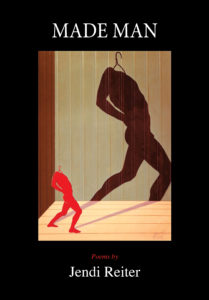Readers know I have mixed feelings about the “always already” trans narrative, but it does say something that my favorite movies as a teenager were “Some Like It Hot” (musicians fleeing the Mafia have to cross-dress to hide in a women’s dance troupe) and “Dead Poets Society” (boarding-school boys read poetry to each other in a cave).
Last month, my husband, who’d never seen the latter film, suggested that we stream it for date night. It was just as beautiful as I remembered. Against our current backdrop of right-wing attacks on school curricula and libraries, the message of literature versus repression hit even closer to home than in 1989. I could also see clearly what I had not understood when I was the same age as the characters–the movie’s only-barely-subtextual queerness. I yearned for this same tenderness between men, which included homoeroticism but went beyond it.
Fortunately, now there’s Google. I went looking for “dead poets society gay” and found, among other things, Adelynn Anderson’s “‘Chased by Walt Whitman’: Or, Why Did Neil Perry Kill Himself?”, a 2020 article at Medium. She makes a persuasive case that “wanting to be an actor” was 1980s-speak for the main character’s real confession to his repressive parents, which he would ultimately rather die than say aloud. The maverick professor played by Robin Williams frequently references Walt Whitman, that Daddy of gay poets, as their role model for an authentic life. Anderson explains why Neil’s struggle has to be coded rather than overt: “Part of the issue is because movies created at this time were still feeling the repercussions of the Hays Code, a code of ‘moral conduct’ for films introduced in the 1930s. It outlawed, among other things, the display or mention of non-heterosexual characters.”
Poet Diana Goetsch is very much alive and getting well-deserved acclaim for her new memoir, This Body I Wore (Farrar Straus & Giroux, 2022), reviewed last month at Autostraddle by Melissa Faliveno. I had the pleasure of hearing her read from it at a Charis Books & More online event. Goetsch had been teaching English and publishing well-regarded books under her former name, while expressing her hidden self in New York City’s cross-dressing social clubs in the 1980s and 90s. She came out as trans at age 50. Faliveno’s essay reflects on queer temporality and late-in-life discoveries:
“There is simply no knowing a thing if it is self-secret,” Goetsch writes, “perhaps because that thing refuses to know itself in your presence. It is like a valley, spread out before you, hiding in plain sight.”
…Queer people are constantly resisting straight time. We often live in direct opposition to it, refusing or unable to buy in, forging our own, often nonlinear, paths. We don’t get married, or we don’t have kids, or we don’t buy houses — those markers that, to the straight world, make us more adult. We exist, instead, in queer time.
Even if we do want some of those things — like marriage (assuming queer folks can still do that in the future), a house, a family — it can take a lot longer to get there, not least because we often spend more time figuring out who we are, interrogating those structures and exploring what we want. But even in queer spaces, there’s pressure to do things a certain way. To come out, for instance, as soon as possible. The problem is that, for a lot of people, it’s not possible. For some people, it’s not safe. For others, we don’t have the models that reflect us, the language that fits. We define and redefine ourselves as we go…
…In queer spaces, we spend so much time urging people to come out. And don’t get me wrong; I believe that coming out, extracting ourselves from the shame that people and institutions place upon us and living our lives as authentically as possible is important — not least in this era of “Don’t say gay” bills and constant threats to queer and trans lives. Speaking our truth can in fact save us. But that pressure can also undermine an individual’s sense of time and space and safety, the acknowledgement that some things take a while.
At the Ploughshares blog, Jessica Hines’ essay “Queer Desire and the Myth of Iphis” looks at how medieval writers questioned social roles by retelling an ancient Greek story of a gender-switching princess. Chaucer’s contemporary John Gower, for instance, commended the myth as a role model for courageous devotion. The socially transformative power of queerness, which made the church and the state afraid, can also make lovers brave.
Iphis’ story is one of magical transformation. Assigned female at birth, Iphis is raised as a boy by their mother, Telethusa, due to their father’s decision that all female children will be killed in infancy. All goes well until Iphis becomes engaged to a young woman, Ianthe. Ianthe and Iphis long for each other and deeply desire marriage. Iphis and Telethusa keep delaying the marriage, however, because they fear that it will expose Iphis’s secret. Iphis laments loving Ianthe, seeing it as, in Valerie Traub’s terms, amor impossibilis—an impossible love. Iphis lacks a phallus and thinks this indicates that they do not have the physical means to satisfy their desire (this detail gets me every time—if only Iphis had had access to sex positive sex ed!). And so, Iphis worries that even as they will get what they most desire through marriage—Ianthe as a wife—Iphis will not be able to “complete” that love and will ultimately risk exposure and humiliation. In the end, the goddess Isis intervenes, and Iphis transforms into a man (perhaps biologically, perhaps socially—Ovid’s original isn’t entirely clear). Iphis and Ianthe live happily ever after…
…Gower’s story of Iphis occurs as part of a much larger work, a poem called the Confessio Amantis, in which a failing lover, Amans, gets advice from his priest, the allegorical figure Genius. Genius tells the story of Iphis in the section of the poem about the sin of sloth. Amans confesses that slothfulness, particularly in the form of pusillamité, cowardice, has frustrated his efforts as a lover. Genius tells Iphis’s story as a counternarrative, a story of how great courage can win love. Iphis and Ianthe, with their willingness to throw themselves into Some Thing—some desire, some practice, some love—that was all unknown to them, are an example of the kind of courage that can help someone reach great love.
I don’t want to oversell what’s happening here. Gower isn’t out marching in the medieval equivalent of a Pride parade. But there is something shockingly moving in the fact that Gower brands this expression of desire as a cure for cowardice. It frames the willingness to exist in the epistemological uncertainty constructed by unknown desire as a type of courage. It suggests that the willingness to move into the unknown spaces of desire and bodily union is powerful and transformative. That there is something to be desired and worthy of imitation—something that cowardly lovers should learn from—in the dwelling in obscurity, in the unknown spaces, of sex and desire.
I wish I didn’t have to repeat myself that throwing trans people under the bus will not save democracy, but mainstream media is enamored with this idea that Democrats would have the bandwidth for real social change if only they didn’t have to worry about the pronoun police. At the social justice news outlet Truthout, journalist Kelly Hayes talked with ACLU lawyer Chase Strangio last month about why attacks on trans rights are an integral part of the fascist strategy to control everyone’s sexuality, healthcare, and family formation. Scapegoating misunderstood minorities is also a convenient pressure-release valve for the trauma of life under authoritarianism. Hayes observes:
Cultivating a disregard for suffering is going to be fundamental to any capitalist system, as we move forward in this era of drastic inequity and catastrophe. But for the Republicans, the goal is not simply to cultivate an indifference to extreme and routine acts of violence against targeted groups, but also, to satisfy an enthusiasm for that violence…
…As we saw under the Trump administration, a government can fail to deliver on nearly all of its promises, but still enjoy the celebration of a fascist movement if the state offers up violence that its followers experience as redemptive.
The GOP does not plan on doing anything to make anyone’s life better, and it’s not really even pretending to offer any plans that would do that, but it is promising white people, cis men, and cis women who feel threatened by trans women, a form of social retribution.
Strangio concurs, and connects “gender-critical” feminism to racism:
[W]hite women in particular have been central to mechanisms of white supremacy in the sort of structural political sense, even when cast as sort of outside of typical power structures. Sort of there’s this long history of white womanhood being situated as that which needs protecting, which builds some of the most violent mechanisms of state power, and we can sort of trace that through the entire structural formation of the United States as a nation state, where you have protecting white women and this being used in the service of mass violence against Indigenous communities, against enslaved communities, and to perpetuate lynchings, to fuel mass incarceration, to propagate wars globally…
…And in the context of anti-trans bills, this is very much part of the continuation of that legacy wherein you have in particular a lot of cis white girls and their white parents, in particular their white mothers, sort of evoking this idea that their daughters are being threatened by this monstrous other that needs to be controlled and removed and the state needs to step in as protector.
Later in the interview, Strangio takes aim at the argument that gender identity is a frivolous “culture war” issue distracting us from real material concerns:
I have truly never understood the culture war discourse as anything other than some sort of media narrative to minimize and sort of invisibilize structural power. Everything and nothing are culture wars all at once. We are constantly having fights over yet sort of who can live and die. That is the nature of politics. And that is inextricable from all of the things that we might understand to be culture and cultural norms.
And so every conversation about gun control or foreign policy or taxation or housing, I mean, those are culture wars. It’s a conversation about who is centered in our understanding of our ideological and cultural norms in this country.
Honestly it reminds me of the irritating progressive Christian platitude that “what matters is not what you believe, but what you do”–as if there could be any action without a belief behind it.
Speaking of Christianity, I was struck by the originality and boldness of these Easter weekend reflections from philosopher Adam Kotsko’s blog, which obviously I am catching up on several months after the fact. In his post for Good Friday, “The Cross: That’s How They Get You”, Kotsko remembers praying the rosary during the end of his Catholic phase and deciding that it no longer felt wholesome and redemptive to meditate on Christ’s martyrdom:
People talk about the power of “making martyrs,” but martyrs are very easily recruited by the powers that be, to shore up their own legitimacy. And within the first generation of Christians, even as they were living under Roman persecution, the Christians themselves were helping out with that process. You can find the outlines of an anti-imperial account of the cross in the synoptics, especially Mark, but even in Mark you already see the beginning of the effort to deflect culpability from the Romans to the Jews.
I’d propose that the real effect of the cross imagery in history has been more akin to the imagery of the fetus in pro-life circles (which obviously overlap heavily with Christian circles) — a fantasy of victimhood that incites fantasies of revenge. The cross has incited more pogroms than revolutions, it seems, and when it has inspired revolutions, Christians have been among its greatest opponents. Among more well-meaning Christians, the cross seems to underwrite a kind of magical thinking about redemptive suffering, as though being beaten up by the police and arrested will somehow in itself produce social change. It turns the performance of state terror into a performance for the state, which will somehow shame it into doing the right thing. The very sign of a social order that is irredeemable — the fact that it publicly tortures people to death in order to terrorize populations into submission — becomes a sure method for helping the powers and principalities to find their best selves.
I’d argue this is why Christian writers and churches are so much more enamored of abuser-redemption stories than supporting survivors’ resistance. Kotsko’s post on Holy Saturday calls out the guilt-trip underneath the message of free salvation:
So God becomes man in Jesus Christ, God submits to the humiliation of birth as a helpless infant, God experiences the ignorance and insecurity and fear that make up a human life, God contrives to antagonize the legal authorities until he can count on being publicly tortured to death to fulfill the demand of — God. God dies on the cross to satisfy God’s demand for punishment, to calm God’s wrath. God dies on the cross to save us from God — hallelujah!
…And after the delirious, incredulous joy of this bizarre moment, the next section reveals the truth: God’s payment of our debt of sin was not true forgiveness, not a clearing of the books, but a consolidation loan. He died for you, can’t you live for him? God is willing to offer you for forgiveness, and all he asks in return is your very life, your very soul. God saves us from God by binding us ever more closely to God, indebting us more profoundly to the one who sacrificed himself for us.
That’s love, right? That’s what love looks like: sacrificing yourself, so that you can emotionally blackmail the loved one. That’s what love looks like: giving up everything, so that the beloved can never leave. That’s what love looks like: playing the carrot of forgiveness off against the stick of the old regime, the supposed “Old Testament God” whose threat and demand remains the only background against which this heroic self-sacrifice can even remotely make sense. That’s love — love for the debtor who will always only be debtor, love for the debtor who now carries not just a debt of sin but the burden of having somehow caused the death of God. That’s love.
If that’s the only way God knows how to love, then I don’t want God’s love. If that’s what the death of God on the cross is meant to accomplish, then maybe we’d be better off if God stayed dead.
There is a minority tradition in the West — running from Hegel and Nietzsche up to Altizer and Žižek (and maybe, I’d dare to suggest, by way of Bonhoeffer) — that claims that that is precisely how we should interpret the cross. God dies, permanently and irrevocably, leaving us alone to figure out for ourselves how we want to live our life together.





